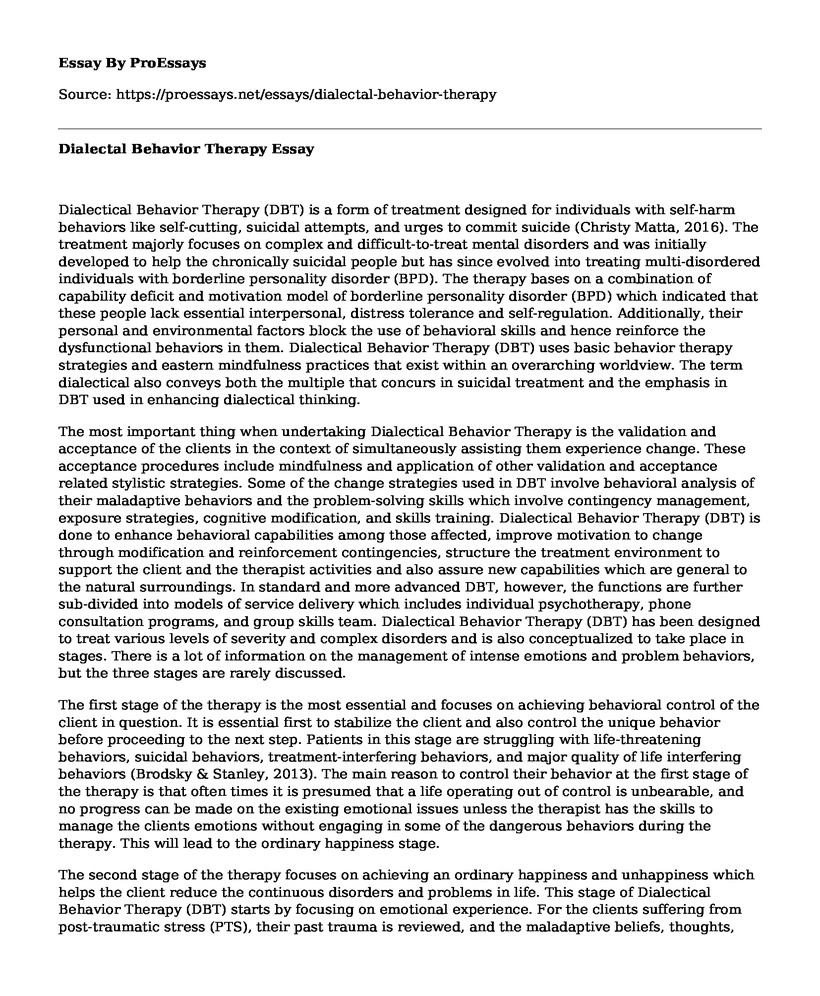Dialectical Behavior Therapy (DBT) is a form of treatment designed for individuals with self-harm behaviors like self-cutting, suicidal attempts, and urges to commit suicide (Christy Matta, 2016). The treatment majorly focuses on complex and difficult-to-treat mental disorders and was initially developed to help the chronically suicidal people but has since evolved into treating multi-disordered individuals with borderline personality disorder (BPD). The therapy bases on a combination of capability deficit and motivation model of borderline personality disorder (BPD) which indicated that these people lack essential interpersonal, distress tolerance and self-regulation. Additionally, their personal and environmental factors block the use of behavioral skills and hence reinforce the dysfunctional behaviors in them. Dialectical Behavior Therapy (DBT) uses basic behavior therapy strategies and eastern mindfulness practices that exist within an overarching worldview. The term dialectical also conveys both the multiple that concurs in suicidal treatment and the emphasis in DBT used in enhancing dialectical thinking.
The most important thing when undertaking Dialectical Behavior Therapy is the validation and acceptance of the clients in the context of simultaneously assisting them experience change. These acceptance procedures include mindfulness and application of other validation and acceptance related stylistic strategies. Some of the change strategies used in DBT involve behavioral analysis of their maladaptive behaviors and the problem-solving skills which involve contingency management, exposure strategies, cognitive modification, and skills training. Dialectical Behavior Therapy (DBT) is done to enhance behavioral capabilities among those affected, improve motivation to change through modification and reinforcement contingencies, structure the treatment environment to support the client and the therapist activities and also assure new capabilities which are general to the natural surroundings. In standard and more advanced DBT, however, the functions are further sub-divided into models of service delivery which includes individual psychotherapy, phone consultation programs, and group skills team. Dialectical Behavior Therapy (DBT) has been designed to treat various levels of severity and complex disorders and is also conceptualized to take place in stages. There is a lot of information on the management of intense emotions and problem behaviors, but the three stages are rarely discussed.
The first stage of the therapy is the most essential and focuses on achieving behavioral control of the client in question. It is essential first to stabilize the client and also control the unique behavior before proceeding to the next step. Patients in this stage are struggling with life-threatening behaviors, suicidal behaviors, treatment-interfering behaviors, and major quality of life interfering behaviors (Brodsky & Stanley, 2013). The main reason to control their behavior at the first stage of the therapy is that often times it is presumed that a life operating out of control is unbearable, and no progress can be made on the existing emotional issues unless the therapist has the skills to manage the clients emotions without engaging in some of the dangerous behaviors during the therapy. This will lead to the ordinary happiness stage.
The second stage of the therapy focuses on achieving an ordinary happiness and unhappiness which helps the client reduce the continuous disorders and problems in life. This stage of Dialectical Behavior Therapy (DBT) starts by focusing on emotional experience. For the clients suffering from post-traumatic stress (PTS), their past trauma is reviewed, and the maladaptive beliefs, thoughts, and behaviors identified for further therapy. The major agenda of the identification of their past is to reduce traumatic stress as much as possible, and this can only be achieved through the remembrance and acceptance of the earlier traumatic situations in their lives, through reduction of self-stigmatization and self-blame. Additionally, there is a need to reduce the denial and possible intrusive response syndrome among the clients and resolve the dialectical tension concerning those they blame for their situation. This stage can be achieved when the behavior is under control.
The primary objective of the third stage when undertaking the DBT is to solve the existing daily living problem and improve happiness and joy in their life. The third stage majorly deals with making the clients to own their behavior, building trust amongst themselves and also living to value the person in them. This is also important and will lead to the final stage of the therapy which will achieve eventual healing. The sense of incompleteness and lack of joy is achieved (Van, 2012).
The final stage towards ultimate healing to disorder is achieving of perfection and allowing the client to build a capacity for joy. In general, the focuses of the treatment is first to control of the behavior then help the patient feel better during the therapy in order to resolve issues in living and residual disorders then find joy for some sense of transcendence.
References
Brodsky, B. S., & Stanley, B. (2013). The dialectical behavior therapy primer: How DBT can inform clinical practice. Chichester, West Sussex: John Wiley & Sons.
Christy Matta, M. (2016). The 4 Stages of Treatment in Dialectical Behavior Therapy. Psych Central.com. Retrieved 18 March 2016, from http://blogs.psychcentral.com/dbt/2010/09/the-4-stages-of-treatment-in-dialectical-behavior-therapy/
Van, D. S. (2012). DBT made simple: A step-by-step guide to dialectical behavior therapy. Oakland, CA: New Harbinger Publications.
Cite this page
Dialectal Behavior Therapy. (2021, Mar 11). Retrieved from https://proessays.net/essays/dialectal-behavior-therapy
If you are the original author of this essay and no longer wish to have it published on the ProEssays website, please click below to request its removal:
- Flourishing and Happiness as an Educational Objective Paper Example
- Essay Example on Romantic Intimacy: Dreams, Hopes, and Expectations
- Essay Sample on Effect of ADHD on Child, Parents, and Siblings
- Essay Sample on Parents of Autistic Children: Perceptions and Use of Supplemental Treatments
- Essay Example on Positive Psychology: The Science of a Worthwhile Life
- Psychotherapy for Trauma: Addressing Childhood Sexual Abuse's Impact - Report Example
- Free Personal Statement Sample on Pursuing an MBA







